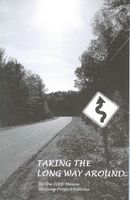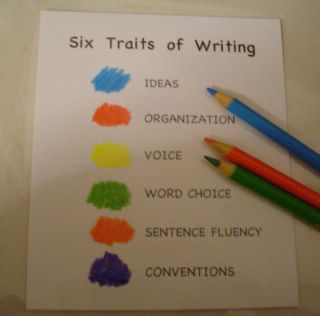Nancy Atwell, founder of Center for Teaching and Learning, expects that each of her students attempts professional publication. I'm encouraging my students to do the same. I believe that students take more pride (are willing to take the time and put in the effort) when there's a real, authentic audience for their writing. Publishing is taking on a greater importance in my classroom this year. Below is a "starting place" for resources. Please, send me an email if you have others to share.
KidPub Children's Publishing (online)
New Moon (magazine)
Stone Soup (magazine)
Potluck (magazine)
Chicken Soup for the Soul (magazine)
Teen Ink (This online resource lists many different opportunities and links for student publishing!)
"What happens to students’ intellectual efforts when there’s no place to showcase it? Most of it winds up crumpled in backpacks, in the trash, or in a box in the basement."—Joe Moses, founder and president of Classroom Publishing
Sunday, October 29, 2006
I'm Published!

Taking the Long Way Around
by the 2006 Maine Writing Project Fellows
As a culminating activity for the Maine Writing Project, each participant submitted 1-2 pieces of writing to be published. This anthology is an expectation for each year. An editing board was established by the end of the project, and those members met a few times to organize the material, design a cover, and find a publisher. The budget (for about 100 bound copies) was about $600.
The one poem that I submitted had a huge typo, but nevertheless, I was excited to see my writing in print. And my students were even more excited. They just couldn't believe that their teacher, someone they actually know, had a piece of writing published. Their reaction has motivated me (even more) to continue to search for local authors to visit our classroom and to closely examine the lives of published authors. My students aren't yet convinced that authors are real people who write about or are inspired by real-life experiences.
Tuesday, October 10, 2006
Visible Revision

NEW IDEA: I recently participated in the Maine Writing Project. There, a colleague shared a way of examining the characteristics of memoir by using a color-coding revision technique. Although I have not yet taught a memoir unit, I have adapted this activity to my students' use of the Six Trait model for writing. Before students conference with me during our Writing Workshop, I expect that they apply the revision strategies that they learned during whole or small-group instruction in their own writing. Using colored pencils is a way for students to work with one trait or skill at time... and the colors show evidence of (independent) revision.
I believe in the use of Vicki Spandel's Six-Trait analytical model for teaching writing. This model is not a new curriculum. It's a vision. It's a way of using common language to identify the characteristics of good writing. Writers have considered these traits for years. They are a shared vision for writing- a way of seeing and talking about writing that helps us to understand what makes it work.
I also believe that students are conditioned to see assessment as grading. This usually takes place at the end of the writing process where it is the least powerful. Assess comes from the Latin word assidire, which means "to sit beside." By using rubrics, students are their first primary assessors for their own work early in the process. It's difficult to strive for something if you don't know what it looks like. The rubrics show what the traits look like at different levels of performance. For my students, they are not used solely for the purpose of grading but are a framework for revision.
Monday, October 09, 2006
Poem Versus Paycheck
What Teachers Make
by Taylor Mali
He says the problem with teachers is, "What's a kid going to learn
from someone who decided his best option in life was to become a teacher?"
He reminds the other dinner guests that it's true what they say about
teachers:
Those who can, do; those who can't, teach.
I decide to bite my tongue instead of his
and resist the temptation to remind the other dinner guests
that it's also true what they say about lawyers.
Because we're eating, after all, and this is polite company.
"I mean, you¹re a teacher, Taylor," he says.
"Be honest. What do you make?"
And I wish he hadn't done that
(asked me to be honest)
because, you see, I have a policy
about honesty and ass-kicking:
if you ask for it, I have to let you have it.
You want to know what I make?
I make kids work harder than they ever thought they could.
I can make a C+ feel like a Congressional medal of honor
and an A- feel like a slap in the face.
How dare you waste my time with anything less than your very best.
I make kids sit through 40 minutes of study hall
in absolute silence. No, you may not work in groups.
No, you may not ask a question.
Why won't I let you get a drink of water?
Because you're not thirsty, you're bored, that's why.
I make parents tremble in fear when I call home:
I hope I haven't called at a bad time,
I just wanted to talk to you about something Billy said today.
Billy said, "Leave the kid alone. I still cry sometimes, don't you?"
And it was the noblest act of courage I have ever seen.
I make parents see their children for who they are
and what they can be.
You want to know what I make?
I make kids wonder,
I make them question.
I make them criticize.
I make them apologize and mean it.
I make them write, write, write.
And then I make them read.
I make them spell definitely beautiful, definitely beautiful, definitely
beautiful
over and over and over again until they will never misspell
either one of those words again.
I make them show all their work in math.
And hide it on their final drafts in English.
I make them understand that if you got this (brains)
then you follow this (heart) and if someone ever tries to judge you
by what you make, you give them this (the finger).
Let me break it down for you, so you know what I say is true:
I make a goddamn difference! What about you?
by Taylor Mali
He says the problem with teachers is, "What's a kid going to learn
from someone who decided his best option in life was to become a teacher?"
He reminds the other dinner guests that it's true what they say about
teachers:
Those who can, do; those who can't, teach.
I decide to bite my tongue instead of his
and resist the temptation to remind the other dinner guests
that it's also true what they say about lawyers.
Because we're eating, after all, and this is polite company.
"I mean, you¹re a teacher, Taylor," he says.
"Be honest. What do you make?"
And I wish he hadn't done that
(asked me to be honest)
because, you see, I have a policy
about honesty and ass-kicking:
if you ask for it, I have to let you have it.
You want to know what I make?
I make kids work harder than they ever thought they could.
I can make a C+ feel like a Congressional medal of honor
and an A- feel like a slap in the face.
How dare you waste my time with anything less than your very best.
I make kids sit through 40 minutes of study hall
in absolute silence. No, you may not work in groups.
No, you may not ask a question.
Why won't I let you get a drink of water?
Because you're not thirsty, you're bored, that's why.
I make parents tremble in fear when I call home:
I hope I haven't called at a bad time,
I just wanted to talk to you about something Billy said today.
Billy said, "Leave the kid alone. I still cry sometimes, don't you?"
And it was the noblest act of courage I have ever seen.
I make parents see their children for who they are
and what they can be.
You want to know what I make?
I make kids wonder,
I make them question.
I make them criticize.
I make them apologize and mean it.
I make them write, write, write.
And then I make them read.
I make them spell definitely beautiful, definitely beautiful, definitely
beautiful
over and over and over again until they will never misspell
either one of those words again.
I make them show all their work in math.
And hide it on their final drafts in English.
I make them understand that if you got this (brains)
then you follow this (heart) and if someone ever tries to judge you
by what you make, you give them this (the finger).
Let me break it down for you, so you know what I say is true:
I make a goddamn difference! What about you?
Subscribe to:
Comments (Atom)